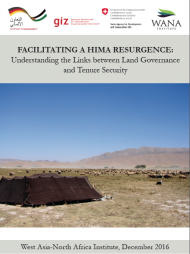-
Facilitating a Hima Resurgence: Understanding the Links ...
Facilitating a Hima Resurgence: Understanding the Links between Land Governance and Tenure Security
Today, traditional land management systems are increasingly at risk. This has consequences, not only for land sustainability but also for the livelihoods and welfare of those depending on such lands. In some areas, increased land scarcity and commoditisation has precipitated a breakdown of the customary rules that govern the equitable and sustainable use of common resources — rules that have in the past functioned to protect lands and the rights of vulnerable groups.
Several organisations have launched efforts to revive traditional land management systems, such as the hima, as a tool in poverty reduction, habitat protection and species conservation. Hima is a traditional land management and conservation system that has operated in the Arab region for thousands of years. This paper argues that key to the effectiveness of such efforts is a revesting of rights and responsibilities over land governance in communities and decentralised government frameworks.
Under previous traditional land management systems, communities employed strict rules to ensure that land was equitably and sustainably managed to guarantee that yields could be enjoyed. Today, while tribes still occupy land, ownership is generally vested in state authorities. Having lost their rights and responsibilities, communities no longer have sufficient vested interest for lands’ proper governance. It is possible to say that where the goal is to enhance the sustainable use of communally-managed land resources, a prerequisite is the vesting of tenure security rights, thus increasing users’ ‘stake’ in the land and resources that accrue from them.
To enhance understanding around how to promote the sustainable management of land resources, this paper draws on observational data collected in three hima sites in Jordan and Lebanon and one provisional hima site in Egypt. The primary aim of this study is to provide data that can be used as a baseline to gauge subsequent changes in land governance in the hima sites. Moreover, this research seeks to further investigate the argument that the strength of land tenure rights is positively correlated to a community’s good governance of land resources.

